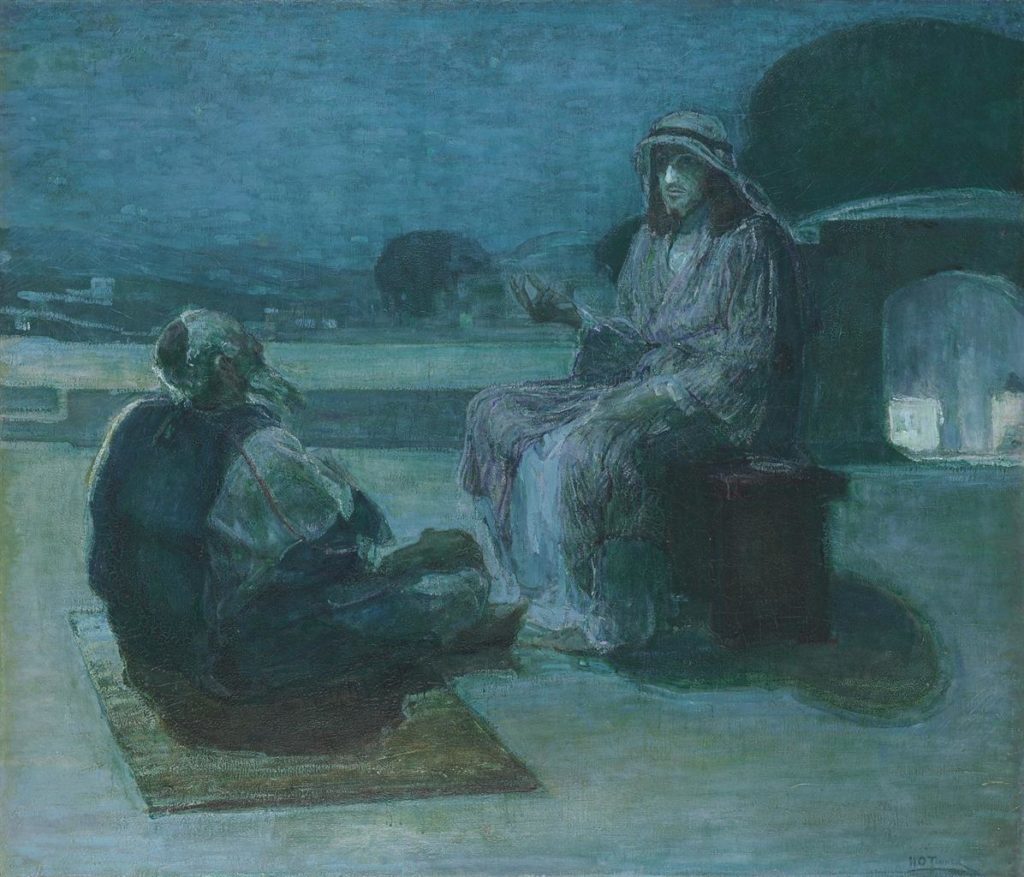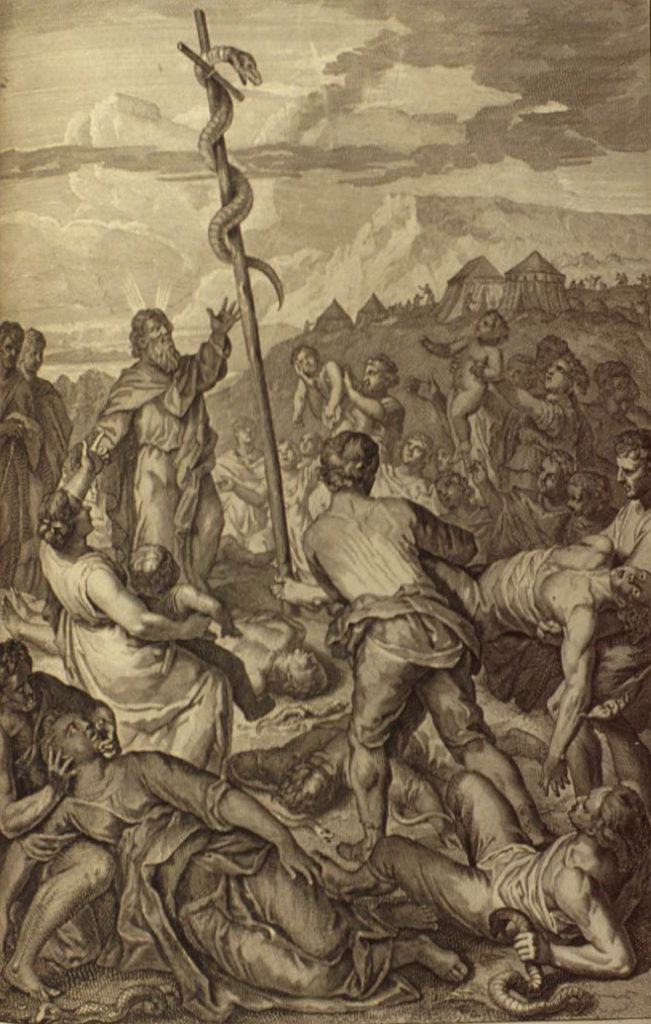Scripture readings: Num. 21:4-9; Ps. 107:1-3, 17-22; Eph. 2:1-10; John 3:14-21 Sermon by Sheila Graham (from John 3:14-21, Numbers 21:4-9 and Ephesians 2:1-10)
Look to Jesus (A Snake Story)
Introduction
Our Gospel reading on this 4th Sunday of Lent includes a beloved verse of Scripture that has been called the gospel in a nutshell:
For God so loved the world that he gave his only Son, so that everyone who believes in him may not perish but may have eternal life. (John 3:16, NRSV)
Nicodemus encounters Jesus
When Jesus spoke these now familiar words, he was in conversation with Nicodemus, a Pharisee and member of the Jewish Sanhedrin (ruling council). Unlike most of his fellow Pharisees, Nicodemus seemed truly interested and open to hearing what Jesus had to teach about God.

(public domain via Wikimedia Commons)
Jesus explained to Nicodemus that to “see the kingdom of God,” one must be “born again.” Though Nicodemus heard what Jesus said, he was confused by what Jesus meant. Jesus explained that he was talking about spiritual, not physical birth.
The Son must be lifted up (the serpent on the pole)
As the conversation with Nicodemus continued, Jesus said something that seems very strange to us—he compares himself to a snake:
Just as Moses lifted up the serpent in the wilderness, so must the Son of Man be lifted up, that whoever believes in him may have eternal life. (John 3:14-15, NRSV)
Jesus is referring to the Old Testament account where Moses made a bronze serpent, attached it to a pole, then told the snake-bitten Israelites to look to it in order to be healed. Why snake-bitten? Because, as usual, the people were complaining against God and Moses. They said it was God’s and Moses’ fault that they had no water and no food. They did have water and they did have food, but they didn’t like what God had given. Bread from heaven just wasn’t good enough for them. Sounds like children who don’t want to eat their vegetables! They seemed to have forgotten that they had been freed from slavery and were on a journey to a land of promise they could call their own. That’s when the snakes appeared and attacked them.
After this reality check, with repentance and seeking help, they came to Moses. Staring death in the face can be quite the motivator!
The people came to Moses and said, “We have sinned by speaking against the LORD and against you; pray to the LORD to take away the serpents from us.” So Moses prayed for the people. And the LORD said to Moses, “Make a poisonous serpent, and set it on a pole; and everyone who is bitten shall look at it and live.” So Moses made a serpent of bronze, and put it upon a pole; and whenever a serpent bit someone, that person would look at the serpent of bronze and live. (Num. 21:7-9, NRSV)

(public domain via Wikimedia Commons)
Many years later, King Hezekiah of Judah had to have the bronze serpent destroyed because the people, true to form, were worshiping it along with their other idols (2 Kings 18:4).
Nicodemus knew these Old Testament stories well. All Pharisees were scholars of the Hebrew Bible and even memorized large sections of it. Perhaps he could see, at least partially, what Jesus was alluding to. He probably immediately thought of Jesus’ ability to heal the sick.
Look to Jesus
What Nicodemus did not understand was that Jesus was foretelling his being “lifted up” in crucifixion, and that all who believed on him would be healed of sin and so inherit eternal life. Jesus, as he often did, was using a physical analogy to explain a spiritual lesson—in this case the one he was teaching Nicodemus.
Just as the Israelites did nothing to save their sorry lives but look to the bronze serpent on a pole, so we come to Jesus empty-handed, having no righteousness of our own, looking to Jesus and his sacrifice, believing in him, trusting our lives to him. We come to Jesus accepting, not doing.
Oh yes, we are told in Scripture to be obedient, but our obedience is our grateful response to what Christ has already done in our lives. Our obedience doesn’t gain us brownie points toward our salvation or, as some might believe, our rank in the kingdom. Sorry, but anything we can do ourselves is just not good enough. We must take on Jesus’ righteousness—we must look to Jesus.
Jesus goes on to tell Nicodemus that God, rather than being out to get us, has sent us his one and only Son to save us:
God did not send the Son into the world to condemn the world, but in order that the world might be saved through him. Those who believe in him are not condemned; but those who do not believe are condemned already, because they have not believed in the name of the only Son of God. (John 3:17-18, NRSV)
How many church signs say just the opposite, that Jesus did come to judge and to condemn. “You think it’s hot here!” or “If you don’t accept the bread of life, you’ll be toast!” It makes you wonder if whoever is responsible for those signs really believes they are going to encourage anyone to come to church!
Receive God’s wonderful grace
Given the way we are wired, it’s hard for us to understand that Jesus has done it all for us—paid our debt, took our judgment upon himself, removed any obstacles between us and reconciliation with God. Even for us who believe in Christ, it’s difficult to fathom the enormity of what Christ has done for us, to grasp how all-encompassing his sacrifice is.
Grace is so wonderful, it’s hard to comprehend.
God’s love for us and his desire to fellowship with us wicked, sinful people is so great that he sacrificed his Son to make it happen. Through Christ, and out of love for us, God has removed all the obstacles in the way of that fellowship. Let’s read the apostle Paul’s reminder of how grateful we should be for what Christ has done on our behalf:
You were dead through the trespasses and sins in which you once lived, following the course of this world, following the ruler of the power of the air, the spirit that is now at work among those who are disobedient. All of us once lived among them in the passions of our flesh, following the desires of flesh and senses, and we were by nature children of wrath, like everyone else. (Eph. 2:1-3, NRSV)
When we look around us at the evil in the world, we can’t deny we have had our part in it. It is only by God’s grace that we have been delivered. And it is out of gratitude for that deliverance, for salvation, that we live our lives as obedient followers of Jesus, which includes sharing his love for all people with those who do not yet know him and so are still suffering the consequences, the guilt and shame of sin in their lives.
We have good news to share!
Rather than rejecting us, God the Father acted in and through Jesus to reconcile all people to himself. From God’s side, there is no longer any barrier between God and humanity. In Christ and by the Spirit we can communicate and fellowship with God!
It is not God’s will that anyone fails to take advantage of this grace, though Scripture says some will reject God’s act of love, repudiating the reconciliation that is theirs with God in Christ. Doing so will be their choice, not God’s.
There’s a sense of joy in Paul’s words about this grace, as he continues in Ephesians:
But God, who is rich in mercy, out of the great love with which he loved us even when we were dead through our trespasses, made us alive together with Christ—by grace you have been saved—and raised us up with him and seated us with him in the heavenly places in Christ Jesus, so that in the ages to come he might show the immeasurable riches of his grace in kindness toward us in Christ Jesus. For by grace you have been saved through faith, and this is not your own doing; it is the gift of God—not the result of works, so that no one may boast. For we are what he has made us, created in Christ Jesus for good works, which God prepared beforehand to be our way of life. (Eph. 2:4-10, NRSV)
It’s all of grace, which means it’s all about Jesus—who he is and what he has done for us, on our behalf. Even in our prayers to God the Father, it is to Jesus that we look. Note what T.F. Torrance has to say:
We do not come before God, then, worshipping him and praying to him in our own name, or in our own significance, but in the name and significance of Jesus Christ alone, for worship and prayer are not ways in which we express ourselves but ways in which we hold up before the Father his beloved Son, take refuge in his atoning sacrifice, and make that our only plea. “Nothing in my hands I bring; Simply to thy Cross I cling.” (from “The Mediation of Christ”)
Conclusion
As we conclude, let me ask: How are we saved? Is it by faithfully attending church every week? That’s good, but is that enough? Is it by how much of the Bible we memorize? Also good, but is that enough? Is it by what we eat or don’t eat, or by how we dress or by what political party we vote for? No, sorry. As Paul says, it’s by grace that we have been saved, through faith. Our salvation is not our doing—it’s God’s gift. It’s not the result of our works, not even of our faith. It’s all about Jesus—his sacrifice and his faithfulness, not our own. Thank you, Jesus!
Seeing Jesus’ horrible torment and death on the cross, we learn just how bad sin is. But, thank God, our sin and guilt have been removed through his perfect sacrifice on our behalf—a sacrifice that included his whole life, all the way to the cross. It is a “done deal”—our debt has been paid in full. God is not out to get us (he never was!). He wants to embrace us in his arms just as the father greeted his returning wayward prodigal son. God is in the saving, not the condemning, business. Thank you, Father!
That’s really good news, don’t you think? Yes, it is, and it is too good not to share. Amen.



Thank you Sheila,
Leigh Sniffen.